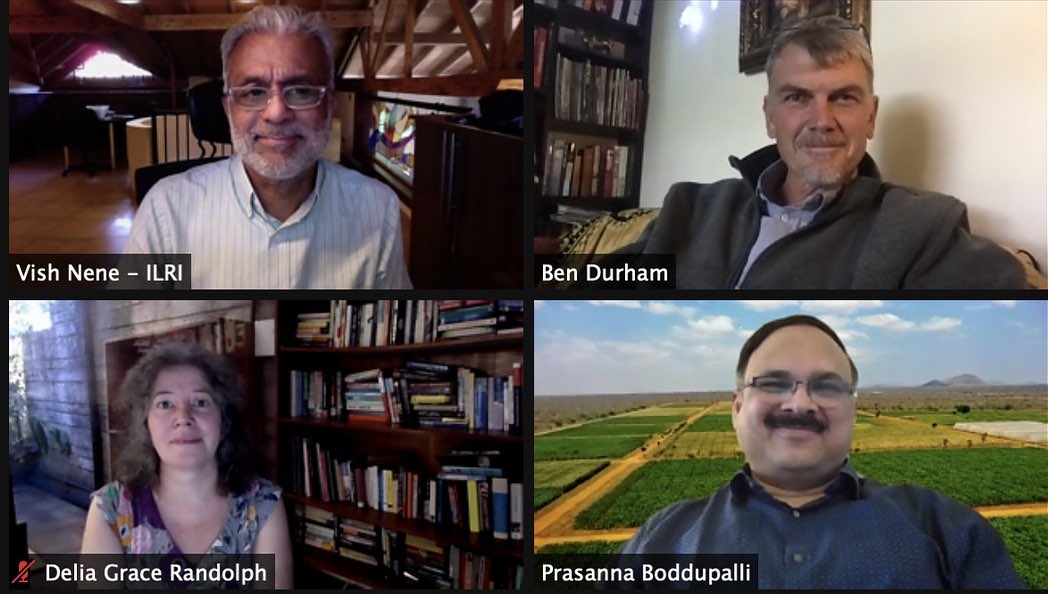The COVID-19 pandemic presents new challenges to publicly-funded food and agricultural research institutions, as government deficits and weakening economies threaten their traditional funding. A Feb. 2 IFPRI virtual policy seminar explored the ways that these organizations can move forward in a changed landscape, as well as the new opportunities that COVID-19 has created for realizing positive transformation in food systems.
Highlights from the discussion include:
- COVID-19 has already sparked rapid progress in vaccine research for zoonotic diseases, and will continue to positively impact food, agriculture, and livestock research by increasing investment in biofortification, synthetic genomics, and livestock zoonosis research.
- Though there may be an increased investment in food and agricultural research in the wake of COVID-19, policy changes are necessary to boost long-term funding for research institutions in low- and middle-income countries.
- Reforming food systems and rebuilding publicly-funded food and agricultural research institutions will require a holistic, collaborative, and sustainability-focused approach.
Carl Pray, Distinguished Professor of Agricultural, Food, and Resource Economics at Rutgers University, expressed a sense of optimism, despite the vast challenges that research institutions are facing during the pandemic: “Advances in biology and information technology are providing new tools to increase the productivity and health of crops and livestock, to improve soil health and improve the nutrition and health of people.”
John McDermott, Director of the IFPRI-led CGIAR Research Program on Agriculture for Nutrition and Health (A4NH), framed the pandemic’s implications for research institutions: “Food and agriculture research is a long-term enterprise, often driven by short-term investment priorities, and within this context COVID-19 has introduced unexpected challenges and opportunities.”
Vish Nene, Co-leader of the Animal and Human Health Program at the International Livestock Research Institute (ILRI), stressed that the pandemic has re-emphasized a need for diagnostic health tools and vaccines, leading to innovation in the field: “We are likely to see an increased investment in livestock zoonosis research and control.”
B.M. Prasanna, Director of the Global Maize Program and the CGIAR Research Program on Maize at the International Maize and Wheat Improvement Center (CIMMYT), highlighted the importance of building more resilient and innovative food systems after the massive disruptions caused by COVID-19. It is also more important than ever to focus on bio-fortified crops, he said—particularly those fortified with zinc: “it provides a safety net for maintaining healthy immune systems, especially for millions of vulnerable populations in Africa, Asia, and South America.”
Delia Grace Randolph, Professor of Food Safety Systems at the University of Greenwich, emphasized the importance of addressing the larger impacts of climate change before focusing in on specific scientific innovations, saying, “we are all just going to go down in the flood, unless we start doing things differently, and stop pretending that by messing around in the margins and doing our little bits of science, it’s going to make things better.”
Ruben Echeverria, IFPRI Senior Research Fellow, suggested COVID-19 could help to catalyze food systems transformation. The pandemic has had negative impacts on global poverty and nutrition, he said, stressing the importance of increasing funding for national food and agriculture research as a way to reverse the damage. “We have fantastic life science and digital technological revolutions, but so far… there is little institutional change in the policies financing public food and agriculture research.”
Ben Durham, Director Chief of Bio-Innovation at the South Africa National Department of Science and Innovation, said technologies plays a central role in increasing resilience in the agricultural sector, whether via increasing efficiency through advanced systems technology, or utilizing technology to enhance trade or biosecurity. He also stressed the need to avoid acting in self-interest when attempting to rebuild in the wake of COVID-19, saying, “what is critical is that we must find a solution, not just for South Africa, not just for individual businesses, we need to find global solutions to the various challenges that we have, to make the world a more sustainable place.”
Honor Dearlove is an IFPRI Communications Intern.







